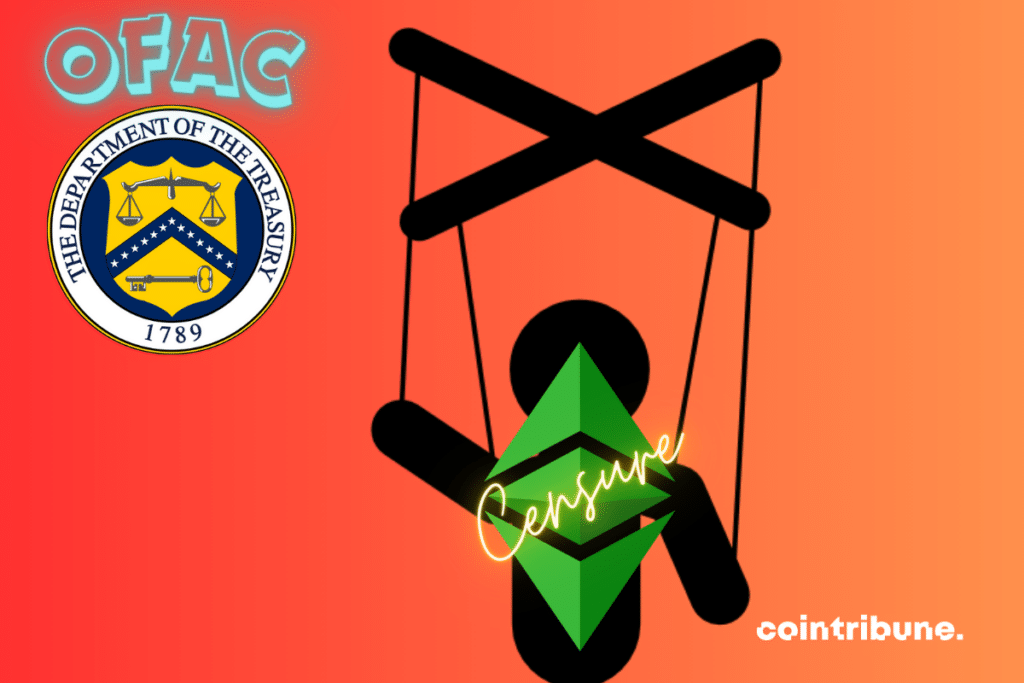More than 72% of Ethereum’s block builders are "censoring" transactions sanctioned by U.S. govt OFAC, data shows, underscoring how “credibly neutral” blockchains have become more centralized as a result of MEV @skesslr reports $ETHhttps://t.co/BIPGuze7LX
— CoinDesk (@CoinDesk) December 7, 2023
A
A
Ethereum Under Pressure: Why Are Some Transactions Censored There?
Fri 08 Dec 2023 ▪
3
min read ▪ by
Getting informed
▪
Has Ethereum become more centralized? The crypto community is sounding the alarm. Indeed, censorship is starting to gain ground on this very popular blockchain. Currently, 4 out of 5 of the largest “block builders” on the network are filtering transactions sanctioned by the U.S. government. Let’s take a closer look!

An Increasingly Centralized Ethereum
Vitalik Buterin was recently subjected to a public lynching while presenting the new Ethereum roadmap. Why attack such a Web3 icon in this way? In fact, he talked about a possible use of the UTxO (Unspent Transaction Output) approach to revise ETH staking. The blockchain he co-founded is so lacking in decentralization that it will have to borrow more innovative and decentralized concepts from other projects.
In a detailed report focused on “Ethereum’s ‘censorship’ problem,” CoinDesk highlighted the disappointment of some researchers and users of the world’s second-largest blockchain. The reason: censorship is starting to make its mark on this network.
According to the results of a study conducted by Toni Wahrstätter, a researcher at the Ethereum Foundation, 72% of the blocks of data displayed on MEV-Boost are currently being censored. As a reminder, MEV-Boost is the intermediary software powering the validators writing blocks on the Ethereum network.
72%, that’s really alarming considering that Ethereum block builders only filtered 25% of transactions in November 2022.
Among the 5 largest block builders of Ethereum, only “Titan Builder” disapproves of this practice. Martin Köppelmann, founder of Gnosis Chain, sounded the alarm by stating:
“If Titan started to censor tomorrow, Ethereum would be censored by more than 90%. So we’re only one constructor away from strong censorship on Ethereum.”
OFAC in Action
The Office of Foreign Assets Control (OFAC) appears to be behind all this commotion. Indeed, by targeting Tornado Cash, with a lawsuit to boot, this branch of the U.S. Treasury Department has, in a way, put pressure on Ethereum block builders. It’s important to note this very important fact: Tornado Cash is an Ethereum-based “private mixing” program that allows traceless transactions.
After OFAC decided to close down the tunnel through which stolen cryptos by North Korea’s Lazarus Group, as well as funds fueling terrorist organizations like Hamas or countries sanctioned by the United States such as Iran and Russia, transits. By adding the computer code of Ethereum-based Tornado to its blacklist, the U.S. regulator would have achieved its intended goals.
Maximize your Cointribune experience with our "Read to Earn" program! For every article you read, earn points and access exclusive rewards. Sign up now and start earning benefits.
A
A
La révolution blockchain et crypto est en marche ! Et le jour où les impacts se feront ressentir sur l’économie la plus vulnérable de ce Monde, contre toute espérance, je dirai que j’y étais pour quelque chose
DISCLAIMER
The views, thoughts, and opinions expressed in this article belong solely to the author, and should not be taken as investment advice. Do your own research before taking any investment decisions.